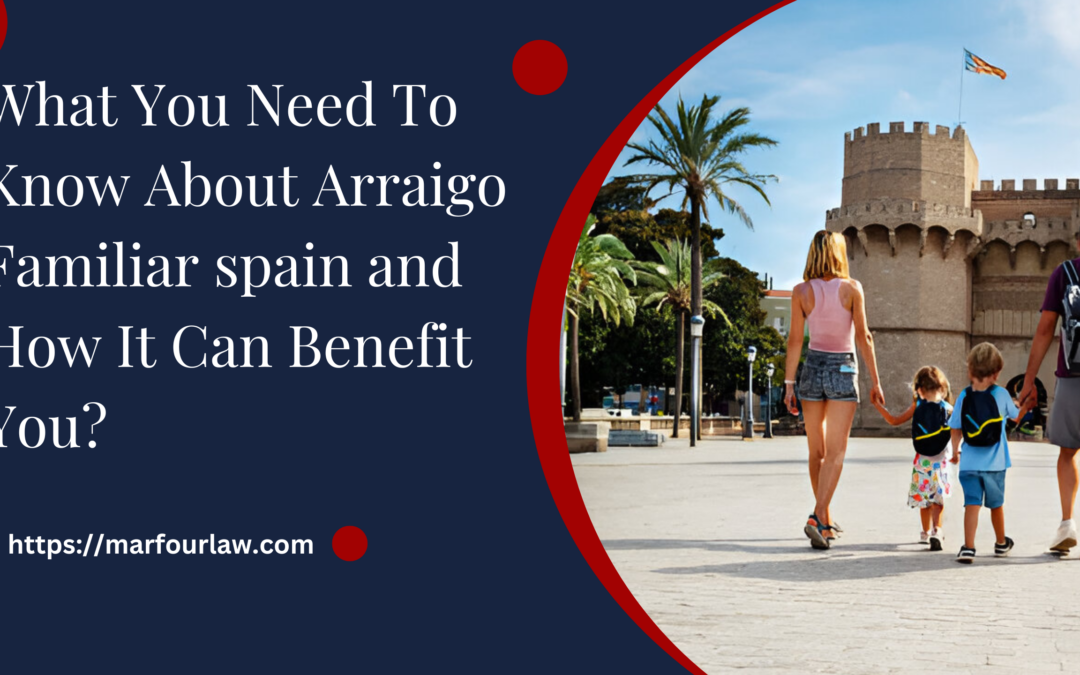Arraigo Familiar spain is a residency permit that allows non-European Union citizens to live and work in Spain legally, provided they have strong family ties in the country. In this blog, we will dive into the key aspects of family arraigo, how to qualify, and what you need to know if you’re considering applying. Whether you’re looking to reunite with family or start a new life in Spain, this guide will help you understand the basics and beyond.
What Is Arraigo Familiar spain?
If you’re looking into residency options in Spain, you might come across the term “Family Arraigo.” This is a special type of residency permit designed for those who have strong family ties in the country. It’s a way for individuals to live and work in Spain based on their close family relationships. Let’s dive into the details to see how this works and who might benefit from it.
What Is Family Arraigo?
Family Arraigo is a type of residence permit available for people who have family members already living legally in Spain. It’s a pathway that allows foreigners to obtain legal status based on their family connections rather than just employment or investment. Think of it like a family reunion where the Spanish government is saying, “If you have close relatives here, you can come and join them legally.”
Eligibility Requirements
To qualify for Family Arraigo, you need to meet specific criteria. First, you must prove that you have a direct family relationship with a Spanish citizen or a legal resident. This could be a parent, spouse, or child. The relationship has to be genuine and documented. You’ll need to show things like birth certificates, marriage certificates, or other official documents that confirm your family ties.
Moreover, you should be able to demonstrate that you have been living with your family in Spain for a certain period, usually for at least one year. This is important because it shows that you are part of the household and not just visiting. It’s a way for the authorities to make sure that the relationship is legitimate and that you are truly integrated into the family unit.
Application Process
Applying for Family Arraigo involves several steps. You’ll start by gathering all the necessary documents that prove your relationship with your family member and your residence in Spain. This includes proof of your identity, your family member’s legal status, and any documents showing you live together.
Next, you will submit your application to the local immigration office. It’s crucial to fill out the forms accurately and provide all required documents to avoid delays. The processing time can vary, but generally, you should expect a few months before receiving a decision.
Benefits of Family Arraigo
Obtaining Family Arraigo comes with several benefits. First and foremost, it grants you legal residency in Spain, allowing you to live, work, and enjoy the country’s amenities. It also paves the way for you to eventually apply for long-term residency or citizenship, depending on how long you stay and other factors.
Additionally, having legal residency can make your daily life much easier. You can access public services, healthcare, and other benefits without worrying about your immigration status. Plus, it gives you the peace of mind that comes with being legally recognized as part of your family’s household.
Important Considerations
While Family Arraigo offers a great opportunity, it’s not without its challenges. Make sure you thoroughly check all the requirements and ensure you meet them before applying. It’s also wise to consult with an immigration lawyer or expert to guide you through the process and avoid common pitfalls.
In summary, Family Arraigo is a way to gain legal residency in Spain through close family ties. By meeting the eligibility criteria, following the application process, and understanding the benefits and considerations, you can make the most of this option and enjoy life in Spain with your loved ones.
Eligibility Requirements for Arraigo Familiar spain
If you’re looking into family arraigo in Spain, you probably want to understand what makes you eligible. This type of residency permit is specifically designed for people who are in Spain and have family ties here. Let’s break down what you need to qualify.

Residency Status
First off, you need to be residing in Spain legally. This means you should have been living in the country continuously for at least three years. Your presence needs to be documented, so keep records like utility bills or lease agreements that show you’ve been here for the required time.
Family Connections
The family arraigo process is closely tied to having family members who are either Spanish citizens or legal residents in Spain. Typically, you need to be a close relative, such as a spouse, child, or parent, of a Spanish national or a legal resident. This connection is crucial as it forms the basis of your application.
Proof of Integration
You need to show that you’re integrating into Spanish society. This can be demonstrated through various means, like participating in local activities, having a stable job, or speaking Spanish. Basically, you should be able to show that you’re making an effort to be part of the community.
Financial Stability
To qualify for family arraigo, you need to prove that you can support yourself financially. This usually means showing that you have a steady income or sufficient financial resources. This ensures that you won’t become a burden on the state.
Good Conduct
You also need to have a clean criminal record. This involves providing a certificate of good conduct from Spain and your home country. This helps to prove that you’ve been following the laws and are a responsible individual.
Health Insurance
Having health insurance is another requirement. You need to prove that you have coverage either through the Spanish public health system or a private insurer. This is to ensure that you have access to medical care without relying on public services.
Application Process
Once you meet all the requirements, you must submit your application to the local immigration office. It’s essential to gather all necessary documents, such as proof of residence, family ties, and financial stability, to make the process smoother.
Additional Tips
If you’re unsure about any part of the process, consider seeking advice from an immigration lawyer or a local support organization. They can guide your situation and help ensure you meet all the requirements.
Navigating the family arraigo process might seem challenging, but breaking it down into these steps can make it more manageable. Keep track of your documents and stay informed about any changes in the law to ensure your application goes smoothly.
How to Apply for Arraigo Familiar spain?
If you’re looking to apply for Family Arraigo in Spain, you’re in the right place. This residence permit allows foreign nationals to stay in Spain if they have close family ties with Spanish citizens or legal residents. Let’s break down the process to help you through it.
Who is Eligible?
To be eligible for Family Arraigo, you must meet specific criteria. First, you must be a foreigner already living in Spain. Second, you must have a close family member who is a Spanish citizen or a legal resident. This can be a spouse, a minor child, or in some cases, a dependent relative. You also need to prove that you have lived in Spain continuously for a certain period, usually three years.
Gather Required Documents
Before starting the application process, ensure you have all the necessary documents. You’ll need proof of your relationship with your family member, such as marriage certificates or birth certificates. Additionally, you must provide evidence of your continuous residence in Spain, like utility bills or rental agreements. Don’t forget to include your passport, photos, and any other documents that might support your application.
Submit Your Application
Once you have all your documents ready, it’s time to submit your application. You’ll need to go to the immigration office or the nearest police station with a foreigners’ department. Ensure you complete the application forms correctly and provide all the necessary documents. If you’re unsure about any part of the application, it’s a good idea to ask for help from a legal advisor or someone familiar with the process.
Wait for the Decision
After submitting your application, you’ll need to wait for a decision. The processing time can vary, but typically, you can expect to hear back within a few months. During this time, it’s important to keep track of your application status and stay updated on any additional requirements. If your application is approved, you’ll receive your Family Arraigo residence permit to live and work in Spain.
What to Do After Approval
Once you’ve received your Family Arraigo permit, there are a few more steps to take. You’ll need to register with the local authorities and get a Spanish ID card. This card will be your official proof of residency and necessary for various activities, such as opening a bank account or accessing healthcare services.
Applying for Family Arraigo in Spain can be straightforward if you’re well-prepared. By understanding the requirements, gathering the proper documents, and following the steps carefully, you can improve your chances of a successful application. If you need any assistance, don’t hesitate to seek advice from professionals who can guide you through the process. Good luck with your application!
How Long Does Arraigo Familiar spain Take?
If you’re considering applying for family arraigo in Spain, you might wonder how long the process takes. Let’s break it down and make it as straightforward as possible.

Processing Time
After your application is submitted, the actual processing time starts. On average, the immigration authorities in Spain take about three to six months to review and process family arraigo applications. This timeframe can vary based on factors such as the workload of the immigration office and the complexity of your case.
During this period, it’s a good idea to check in regularly with the immigration office or through their online system if available. This way, you can stay updated on the status of your application and address any additional requirements promptly.
Possible Delays
Keep in mind that delays can happen. Additional information or documentation may sometimes be requested, which can extend the processing time. Also, if there are any issues with your paperwork or the office is experiencing a high volume of applications, you might face longer wait times.
After Approval
Once your family arraigo is approved, you’ll receive your residence permit. You’ll need to follow up with local authorities to finalize any additional paperwork and to ensure you comply with all your new residence status requirements.
In a nutshell, the process for family arraigo in Spain can take a few weeks to several months. Staying organized and patient is key, from gathering documents to waiting for approval. If you stay on top of your paperwork and keep in touch with the authorities, you’ll have a smoother experience. So, gear up and get ready to enjoy your time with family in Spain!
What Happens If Your Arraigo Familiar spain Application Is Denied?
Getting a denial on your Family Arraigo application in Spain can be a significant setback, but staying calm and taking the proper steps to address the situation is important. Here’s a detailed look at what happens next and what you can do about it.
Why Was Your Application Denied?
First, it’s crucial to figure out why your application was denied. The reasons can vary. It might be due to incomplete documentation, financial situation issues, or missing out on specific requirements. Each denial letter should provide a detailed explanation for the decision. Go through this carefully to understand what went wrong.
Can You Appeal the Decision?
Yes, you can usually appeal a denial. The denial letter will include information on how to appeal, including the deadlines and where to submit your appeal. You’ll need to address the issues mentioned in the denial letter and provide any additional information or documents requested. This is your chance to correct any mistakes or omissions.
How to Improve Your Chances on Reapplication?
If your appeal doesn’t work or you decide to reapply, you’ll need to fix the issues that led to the initial denial. Gather all the required documents meticulously and ensure they meet the specifications outlined in the application guidelines. You might also consider seeking advice from a legal expert specializing in immigration matters to help you get everything right.
What If You Can’t Appeal or Reapply?
If appealing or reapplying is not an option, you might need to consider other ways to stay in Spain. Explore alternative visa options or legal pathways that might be available to you. Sometimes, changes in circumstances or additional qualifications can make other types of residency permits more accessible.
Staying Informed and Seeking Help
Stay updated on any changes in immigration laws or regulations that could affect your situation. Consulting with an immigration lawyer or advisor can provide you with tailored advice and support. They can help you understand your options and ensure you’re taking the proper steps.
In summary, a denied Family Arraigo application isn’t the end of the road. By carefully reviewing the reasons for the denial, appealing if possible, addressing any issues, and seeking professional advice, you can improve your chances of success in the future.
Can Arraigo Familiar spain Lead to Permanent Residency?
If you want to stay in Spain for the long haul, you might have heard of “Family Arraigo.” It’s one of the ways foreigners can become residents, and it’s beneficial for people in Spain due to family connections. Let’s break down Family Arraigo and how it might lead to permanent residency.
What is Family Arraigo?
Family Arraigo is a residency option in Spain for individuals who have close family ties to Spanish citizens or residents. If you’re married to a Spanish citizen or have a Spanish child, this could be your ticket to staying in Spain longer. It’s part of Spain’s broader immigration policy to keep families together and integrate them into Spanish society.
Eligibility Requirements
To qualify for Family Arraigo, you need to meet certain conditions. Firstly, you must be legally residing in Spain. That means you should have been on a temporary residence permit in Spain for at least three years. Secondly, you must have family ties with a Spanish citizen or resident. This could be a spouse, child, or even a parent in some cases. Lastly, you need to demonstrate that you are integrated into Spanish society. This can be shown through speaking Spanish, participating in community activities, or having a stable income.
Applying for Family Arraigo
When applying for Family Arraigo, you’ll need to provide various documents. These include proof of your relationship with a Spanish citizen or resident, evidence of your legal stay in Spain, and documents showing your integration into Spanish society. The process involves submitting an application to the local immigration office and undergoing an interview, during which you might be asked about your life in Spain and your family connections.
Transitioning to Permanent Residency
One of the big questions people have is whether Family Arraigo can lead to permanent residency. The short answer is yes, but it’s not automatic. Once you’ve held temporary residency under Family Arraigo for a few years, you can apply for permanent residency. This means you must comply with residency requirements, such as maintaining your family ties and integration into Spanish society.
Permanent Residency and Its Benefits
If your application for permanent residency is successful, you’ll enjoy various benefits. Permanent residency in Spain allows you to live and work without frequently renewing your permit. It also opens doors for access to public services, like healthcare and education, and provides a path to citizenship if you wish to become a Spanish national.
Family Arraigo is a valuable route for those looking to stay in Spain due to family connections. While it doesn’t directly grant permanent residency, it sets the stage for you to apply for it after a few years. By meeting the eligibility criteria and proving your integration into Spanish society, you can enjoy the benefits of permanent residency and a stable future in Spain. If you have family ties in Spain and are committed to making it your home, Family Arraigo could be a great option.
What Happens After Your Arraigo Familiar spain Permit Expires?
When your family arraigo permit in Spain expires, knowing what steps to take to avoid complications is crucial. Here’s a straightforward guide on what to expect and what to do.

Expiration of the Permit
First, let’s talk about what happens when your permit runs out. The family arraigo permit is granted to individuals who have lived in Spain for an extended period and are connected to a Spanish national or resident. Once it expires, you’re no longer legally allowed to stay in Spain under the terms of that permit. Staying beyond the expiration date without renewing or changing your status can lead to legal issues.
Options for Renewal or Extension
Before your permit expires, it’s wise to look into whether you can extend it. Sometimes, you might be eligible for a renewal if you meet specific criteria. This might include proving your continued connection to Spain, maintaining stable residency, and meeting other specific requirements. Check with immigration authorities or a legal expert to see if you qualify for an extension.
Applying for a Different Residence Permit
If extending your current permit isn’t an option, you might want to explore other residence permits. Spain offers permits for different situations, such as work or student visas. If you’ve established yourself in Spain and have a job or are studying, you might be able to switch to a different type of permit that suits your current situation. This requires applying for a new license before your current one expires.
Consequences of Staying Illegally
What if you stay in Spain after your permit expires without taking any action? With a valid license, there can be several issues. You might face fines, deportation, or even be barred from returning to Spain for a certain period. It’s essential to handle this proactively to avoid these adverse outcomes.
Seeking Legal Assistance
If you’re unsure about what to do after your permit expires, seeking legal advice is a good move. An immigration lawyer can help you understand your options and guide you through applying for a new license or resolving any issues related to your expired permit. They can offer personalized advice based on your specific situation.
In summary, handling your family arraigo permit’s expiration requires timely action, whether renewing, applying for a different license, or seeking legal advice. Addressing the situation promptly will help you avoid potential problems and comply with Spanish immigration laws.
Marfour International Law Firm specializes in providing tailored legal services to individuals and businesses navigating complex international matters. With a focus on immigration, real estate, and corporate law, Marfour offers expert guidance to clients seeking to establish themselves in new countries or expand their business operations globally.
The firm’s dedicated team combines deep local knowledge with a global perspective, ensuring that clients receive comprehensive support throughout their legal journey. Whether you’re moving to a new country, investing in foreign property, or restructuring your business, Marfour is committed to helping you achieve your goals with confidence.
Frequently Asked Questions (FAQs)
Before diving into the FAQs, let’s clarify some common questions surrounding Arraigo Familiar spain. Whether you’re just learning about this residency permit or already in the process of applying, these FAQs will provide clear answers to help you move forward confidently.
What is Arraigo Familiar spain?
Family arraign Spain is a residency permit allowing non-EU citizens with close family members in Spain to live and work legally.
Who qualifies for Arraigo Familiar spain?
Those with direct family ties (such as parents, children, or spouses) and a Spanish citizen or legal resident who has lived in Spain for at least two years can qualify.
How long does it take to process a family arraigo application?
Depending on various factors, the processing time typically ranges from three to six months.
Can you work in Spain with a family arraigo permit?
You can work legally in Spain once you obtain the family arraigo permit.
What happens if your family arraigo application is denied?
You can appeal the decision if your application is denied by providing additional documentation or correcting errors.
Conclusion
Arraigo Familiar spain is an excellent opportunity for those who wish to reunite with their loved ones and build a life in Spain. From working legally to accessing healthcare, this permit offers numerous benefits. While the application process can seem daunting, with the proper preparation and understanding of the requirements, you can successfully obtain family arraigo in Spain. So, if you’re considering applying, gather all necessary documents and be patient throughout the process.

